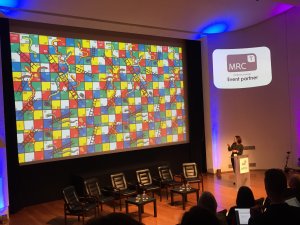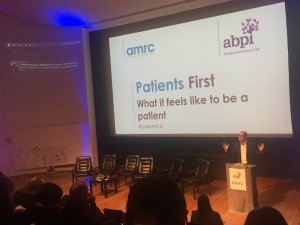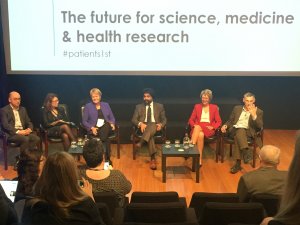Putting Patients First
UKCRC TDCC attended Patients First on 28th November, 2016 – an event co-hosted by ABPI and AMRC. Here we outline the day’s events and what we can learn from the topics discussed.

Jane Taylor, Arthritis Research UK
The event was opened by Aisling Burnand, AMRC, with an inspiring quote by Mary Mead, ‘Never doubt that a small group of thoughtful, committed citizens can change the world. Indeed, it is the only thing that ever has.’ Jane Taylor, Arthritis Research UK, a patient advocate who has suffered from chronic disease discussed her experiences, comparing chronic disease to a strategy game like snakes and ladders (left). Nicola Blackwood MP, then went on to reference her experience of living with an undiagnosed disease, stating that patients and the public should shape innovative research.
Jo Churchill MP, chaired a panel session on making use of patient data. John Carvel was there to discuss the recent review by the National data guardian; the level of governance appropriate to maintain public confidence was also discussed. Nicola Perrin from the Wellcome Trust explained that in a recent review the Trust conducted, less than a third of people had a good idea of how data was used. It was agreed that this was, an important field to work on in the future.
Kay Boycott CE, Asthma UK summed matters up by comparing data to adolescence stating, ‘It’s growing, difficult to manage, it can reveal insights or rubbish but it holds promise for the future.’

Nick Robinson, BBC
Nick Robinson, BBC journalist gave a very frank and personal account of his experience of being a cancer patient. His main feeling was that just knowing the reality of a situation is important (right).
Vivienne Parry chaired one of the afternoon panel sessions on ‘The role of genomics and stratified medicine – how do we put “patients first?”’. A far reaching discussion could be summed up by a comment by lay panel member Janette Rawlinson; ‘Tumours don’t walk into a clinic on their own – they are surrounded by a patient.’

Panellists for future of science, medicine and health research
The final session of the day was on the future of science, medicine and health research (left). The panellists listed a range of innovations from recent years they think have impacted health outcomes. At the end each one made a pledge on how they would put patients first in their future work, with Dr Louise Wood, Dept. of Health resolving to feature patients always at the start of meetings and never the end.
The main take home message of the day was that full public involvement, with complete transparency is vital for successful medical research. The UKCRC TDCC are keen to hear from any members of the public on our work.
Get in touch to find out more.
